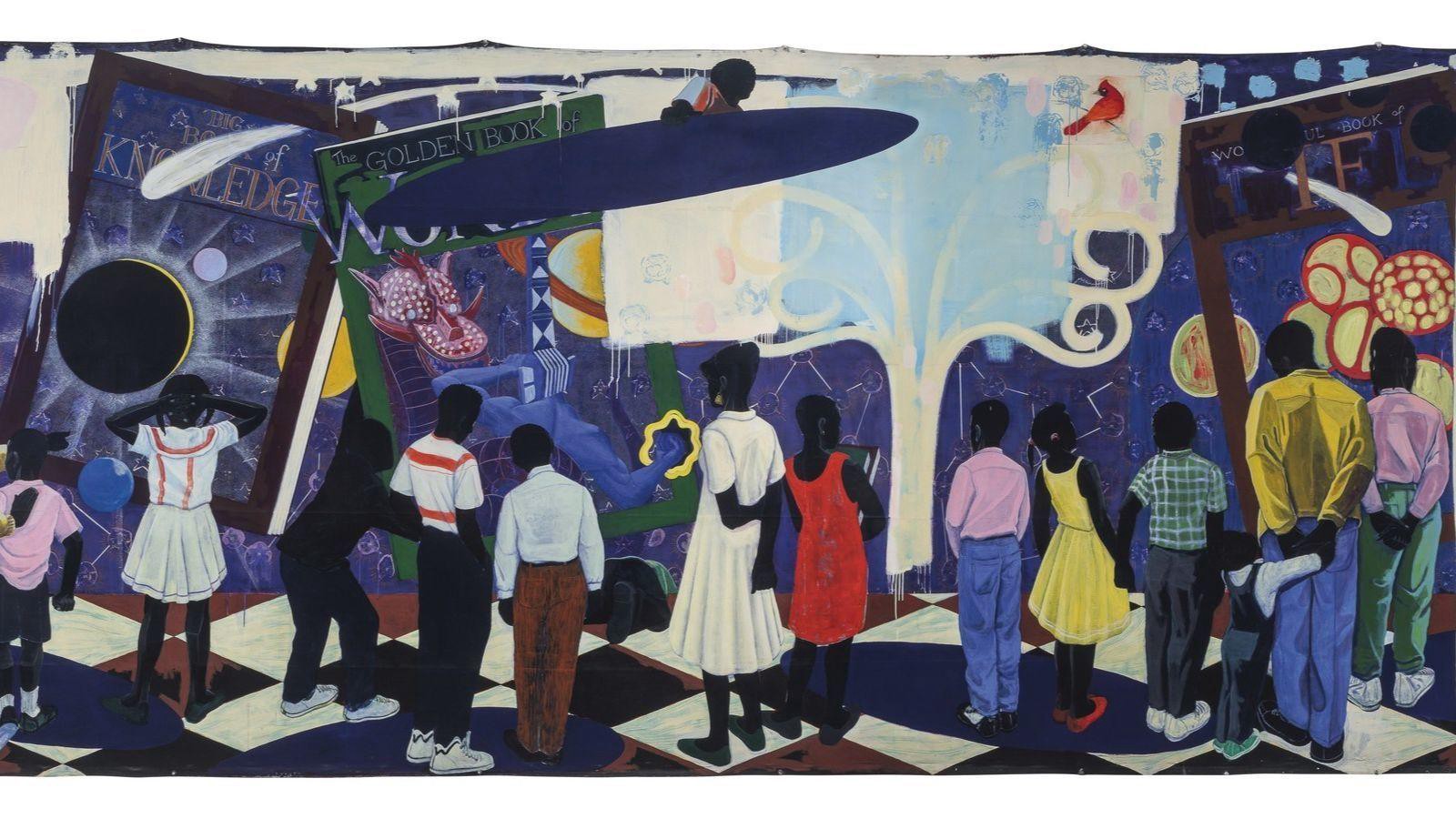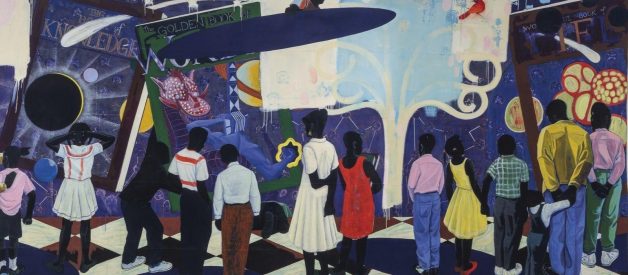It?s okay to call me Black. And if you feel it isn?t, I still insist that you do.
 Kerry James Marshall, ?Knowledge and Wonder? (1995). Photo courtesy of Christie?s.
Kerry James Marshall, ?Knowledge and Wonder? (1995). Photo courtesy of Christie?s.
![]() I understand why ?people of color? has become a popular phrase. It replaces the outdated term ?colored people? with one that is more palatable. It allows for a kind of political solidarity between non-White citizens of the country and the rest of the world. It acknowledges how racism and White supremacy affect people from many groups, not just Black people, and is a platform for their collective shared experiences and concerns.
I understand why ?people of color? has become a popular phrase. It replaces the outdated term ?colored people? with one that is more palatable. It allows for a kind of political solidarity between non-White citizens of the country and the rest of the world. It acknowledges how racism and White supremacy affect people from many groups, not just Black people, and is a platform for their collective shared experiences and concerns.
However, it has its limits ? and that?s why we need to stop saying ?people of color? when we mostly (and sometimes only) mean ?Black people.?
The public use of the term person of color (POC) seems to have become less about solidarity and instead about lessening negative connotations and implicit anti-Black reactions like fear, scorn, disdain, and apathy. In popular discourse, ?POC? is often a shorthand for ?This issue affects Black people most directly and disproportionately, but other non-White people are affected, too. So we need to include them for the majority to listen and understand we aren?t talking about a solely Black vs. White issue.?
Saying ?POC? when we mean ?Black people? concedes that there?s a need to describe a marginalized group as ?less? Black for people to have empathy for an issue.
When I taught a journalism class at DePaul University, two of my students wrote in a media critique assignment that we should use ?African American? because the term ?Black? has negative connotations ? despite the fact I, their instructor, had referred to myself as ?Black? multiple times in class. When it came to writing about police brutality, a couple of students at Salem State used ?people of color? (two students actually used the term ?colored people?) even though local and national discussions on police brutality almost always involve Black victims.
Saying ?POC? when we mean ?Black people? concedes that there?s a need to describe a marginalized group as ?less? Black for people to have empathy for an issue.
The use of ?person of color? is absolutely legitimate, and there are plenty of situations where it?s appropriate to use the term. If you?re discussing why Hollywood should take greater steps for inclusion and diversity, for example, it makes perfect sense to use ?people of color? to describe the issue.
But if you?re raising questions about the lack of Native representation in films, using ?people of color? evades the specific issue. ?We need more Native representation in film? addresses the problem directly and properly centralizes the concerns of the Native film community.
Several communities, including White ones, are negatively affected by the school-to-prison pipeline and police brutality. However, these oppressive systems affect the Black community to a much higher degree ? and, to an extent, were historically designed for that specific outcome. Other groups might face housing discrimination, but the history of redlining in America is a direct response to Black people migrating from the South to northern and western cities.
When President Franklin D. Roosevelt signed Executive Order 9066, U.S. citizens of Japanese ancestry were forced into internment camps. Describing this order as an act of racism against ?people of color? erases the specific historical wrongdoing toward Japanese Americans. When President Donald Trump mocks Sen. Elizabeth Warren by calling her ?Pocahontas,? that dig is disrespectful to Native people, not ?people of color.?
It seems like every week we see a new video of people calling the police on Black people for merely existing in public. Every few weeks, there?s another story of a police officer shooting an unarmed Black person because they ?feared for their life.? Yes, other groups face systemic oppression, but while using ?POC? in these contexts isn?t inaccurate, it feels misleading. A ?People of Color Lives Matter? movement would be useful, but we can understand why ?Black Lives Matter? has a more specific resonance.
For me, ?people of color? feels like a hiding place; like I have to hide a crucial part of me to not tap into the reflexive fear or apathy toward Blackness. Describing myself as ?POC? feels like walking into a space with an apology in hand, a preemptive ?sorry? for any offense my Blackness may have caused.
James Baldwin once said, ?The plea is simple ? look at it.? Words can be a mirror that reflects the world as it is, or they can be prisms that have the potential to amplify but also to distort. Our struggle as a society is to find mirrors.
But maybe my simpler plea is for people to know one thing: It?s okay to call me Black. And if you feel it isn?t, I still insist that you do.


